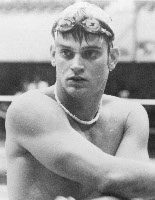
Tim McKee (USA)
Honor Swimmer (1998)
FOR THE RECORD: 1972 OLYMPIC GAMES: silver (200m I.M., 400m I.M.), 5th (200m backstroke); 1976 OLYMPIC GAMES: silver (400m I.M.); 1971 PAN AMERICAN GAMES: silver (200m backstroke); FIVE AMERICAN RECORDS: short course (200y, 400y individual medley, medley relay), long course (200y individual medley, 110y and 220y backstroke).
For a moment back in 1972, the world felt he was an Olympic gold medalist. We looked at the scoreboard at the Munich Olympic Pool and saw the Number One by his name. Then we saw Sweden’s Gunnar Larson’s, Number One. For 8 minutes both times read 4:31.98 and both were listed first place. After consultation, the officials took the time from the timing machine computer tape declaring Gunnar Larson the gold medalist and finishing two one thousands of a second, (10 times faster than the blink of an eye), ahead of Tim McKee of the United States. The Guinness Book of Records called it the closest race in sports history. Using the rules of today, his race results would be considered a tie.
Tim McKee is quoted as saying “You waste the present and the future when you dwell in the past.” His whole swimming career was geared to competing your hardest each and every day. Tim was the fourth child in a family of 9 children – all swimmers at the Suburban Swim Club of Newtown Square, Pennsylvania. His father, Big Al McKee, a former All-American swimmer on the Ohio State University’s National Championship Teams of 1938 and 1939, made sure that the family had a swimming pool for the kids on the property where they resided, even though they lived in the “stables.” All the McKee boys became All-American swimmers. Al coached the Suburban Team from 1962 to 1968.
At 5’8″, Tim had to work hard to compensate for a small body size. But he was strong and flexible with great natural ability. He trained with Frank Keefe in Pennsylvania, graduated form Malvern Prep School in 1971, and enrolled at the University of Florida, swimming for coach Bill Harlan. As a freshman he placed 4th in the 400 I.M. at the NCAA Championships.
Although his time continued to drop, his training for the 1972 Olympics was interrupted by a debilitating bout with mononucleosis. But he fought back and qualified for the U.S. team in the 200m individual medley, 400m individual medley and the 200m backstroke. In Munich he won silver medals in both the 200m Individual Medley and 400m Individual Medley. Following the 400m IM, he laid out cold on the pool deck as his body, still with remnants of the mononucleosis, tried to recover from 4 minutes 31.98 seconds of 100% physical exertion. In the 200m backstroke, Tim qualified for a third final and finished fifth in the race.
As Tim looked back over his career, it was obvious that the color silver was with him the most. At the 1971 Pan Am Games of Cali, Columbia, he silvered in the 200m backstroke, at the 1976 Montreal Olympics, he silvered in the 400m individual medley behind teammate Rod Strachen, even though he bettered the world record in the event by 1.4 seconds. In 1976, the 200m individual medley had been dropped from Olympic competition.
McKee held 6 American Records in the backstroke and individual medley. Just like Canada’s ironman of the 1960s, Ralph Hutton, who pushed others to win the gold, McKee was the ironman of the 1970s, the perennial tough guy.
Today as a Miami Beach Safety Officer, he continues to use his swimming to set records – by rescuing drowning bodies from the ocean and keeping lives afloat.
